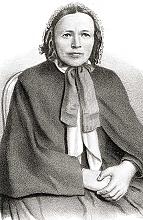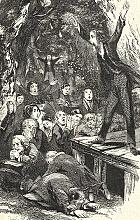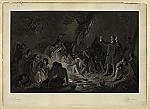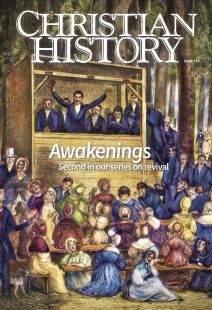“The flame spread more and more”
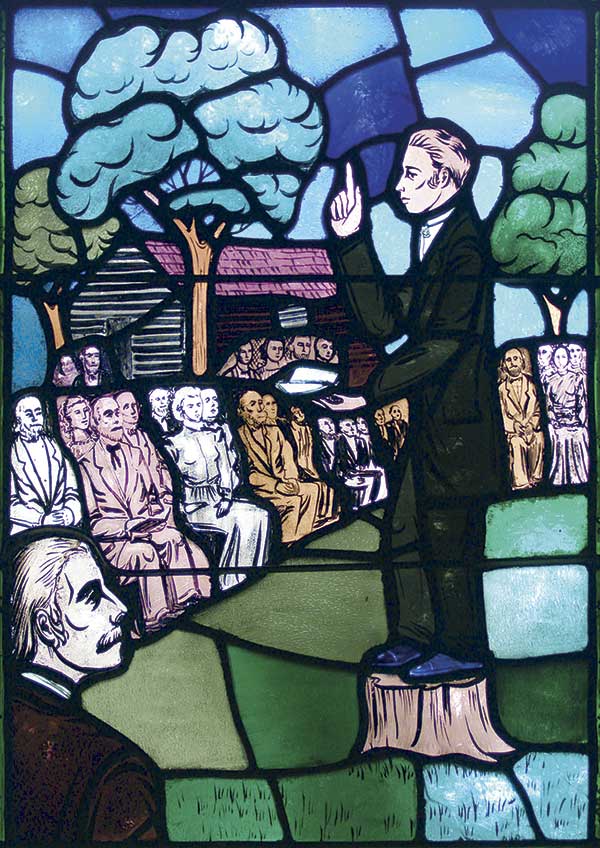
[Barton W. Stone preaching to the people at Cane Ridge in 1801, Stained glass, Cane Ridge Meeting House, Paris, Kentucky—Chris Light / [CC BY-SA 4.0] Wikimedia]
On Friday night preceding the Sacrament at Concord, I was present at a society, held at [Cane Ridge], a united congregation of Mr. Stone, and saw the extraordinary work. Of 50 persons present, nine were struck down. I proceeded next morning to Concord, 10 miles distant, where a sermon was preached, at which several became affected and struck down. The exercises continued all night. . . . The number being so great, the Lord’s Supper was administered at a tent. A great solemnity appeared all day. A number were struck down; on the whole occasion about 150.
The exercises continued . . . without intermission. . . . Add to that, exhortations, praying, singing, the cries of the distressed, on account of sin; the rejoicing of those that were delivered from their sin’s bondage, and brought to enjoy the liberty that is in Christ Jesus; all going on at the same time. About 4,000 persons attended. . . .
The Lord’s Supper was appointed to be held at Point Pleasant, on Stony creek, ten miles above Paris, being one of Mr. Joseph Howe’s congregations. There the flame spread more and more. Curiosity led a great many strangers, I with my family attended. . . .
A wonderful work of God
As well as I am able, I will describe it. . . . Of all ages, from eight years and upwards; male and female; rich and poor; the blacks; and of every denomination; those in favour of it, as well as those, at the instant in opposition to it, and railing against it, have instantaneously laid motionless on the ground. Some feel the approaching symptoms by being under deep convictions; their heart swells, their nerves relax, and in an instant they become motionless and speechless, but generally retain their senses.
It comes upon others like an electric shock, as if felt in the great arteries of the arms or thighs; closes quick into the heart, which swells, like to burst. The body relaxes and falls motionless; the hands and feet become cold, and yet the pulse is as formerly, though sometimes rather slow. Some grow weak, so as not to be able to stand, but do not lose their speech altogether. . . .
When they regain their speech, which comes to them gradually, they express themselves commonly in the following manner—that they are great sinners; the vilest of vile, and pray earnestly for mercy through Christ. . . .
But, I am sure, my description, and your view (if you were an eye witness) would differ as much as day from night. So say those who have first heard and then seen. Notwithstanding that all our ministers, and a vast number of the most respectable and sensible people, in the country, acknowledge, that it is the wonderful work of God; and is marvelously manifested to us; yet there are people so hardened, that they either cannot or will not acknowledge the work to be of God, but represent it in an unfavourable view. . . .
Ministry, not confusion
In order to give you a more just conception of it—suppose so large a congregation assembled in the woods, ministers preaching day and night; the camp illuminated with candles . . . persons falling down, and carried out of the crowd, by those next to them, and taken to some convenient place, where prayer is made for them; some Psalm or Hymn, suitable to the occasion, sung. . . .
If they do not recover soon, praying and singing is kept up, alternately, and sometimes a minister exhorts over them—for generally a large group of people collect, and stand round, paying attention to prayer and joining in singing. Now suppose 20 of those groups around; a minister engaged in preaching to a large congregation, in the middle; some mourning; some rejoicing, and great solemnity on every countenance, and you will form some imperfect idea of the extraordinary work! Opposers call this confusion! But in any of these parties, employment for the mind may be found.
By Colonel Robert Patterson
[Christian History originally published this article in Christian History Issue #151 in 2024]
Extract of a letter to the Rev. Doctor John King (1801)Next articles
Divine disruption
Healing revivals of the nineteenth century fueled later Pentecostalism
Charlie SelfMore great awakeners
These unconventional figures preached the gospel and fomented revival
Jennifer A. BoardmanAwakenings: Recommended resources
Read more about the Great Awakenings and the renewal movements that preceded and followed them in these resources recommended by our authors and the CH team.
the editors



